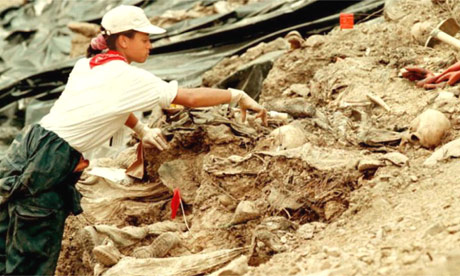Monday, 21 June 2010
BiH : still waiting for national reconciliation

The admissions of the Saville report last week, and the government's apology for Bloody Sunday, remind us of the imperative to acknowledge responsibility for state crimes against civilians, however too little or too late. But in Bosnia, there's a palpable sense that justice for the brutalities of the 1990s is still lacking.
The international criminal tribunal for former Yugoslavia (ICTY) has already begun to discuss what to do if key figures like Ratko Mladić cannot be tried before the ICTY closes. Almost 20 years after the start of the wars of the former Yugoslavia, accountability for war crimes still hasn't been delivered – not by the ICTY, whose narrow focus has always been limited to the top figures; not in the region's domestic courts, which should have been key to societal-level reconciliation yet still lack both capacity and transparency; and not against those who many feel were complicit in the Srebrenica genocide, the "international community", and the UN.
The conviction of the Bosnian Serb officers for genocide at the ICTY last week was, as Slavenka Drakulić has written, a step in the direction of justice. But the same week, news came that Mladić's family are pushing to declare the wartime commander dead, and Mladić's continued evasion of justice is a reminder that the ICTY has failed even in its narrow aim of prosecuting those most responsible for war crimes such as Srebrenica. The absence of transitional justice mechanisms such as a South Africa-style truth commission "on the ground" means even the ICTY's modest successes are detached from the need for societal consensus on what happened, who did what. On top of this, the absence of accountability for the UN's own role in Srebrenica undermines the credibility of international justice as a whole.
An initiative by a German NGO is currently under way to construct a "pillar of shame" intended to draw attention to the UN's failure to fully own up to its share of responsibility for the Srebrenica genocide 15 years after 8,000 unarmed Bosnian Muslim men and boys were murdered by Bosnian Serb forces in the UN "safe area". The pillar will spell out the letters UN using 16,744 shoes, representing the numbers of the victims of Srebrenica, and intends to "serve as a metaphor for the immense betrayal of the UN in Bosnia and Herzegovina". The pillar will be presented at The Hague on 1 July, and in Berlin on 11 July, the day Srebrenica fell to the Bosnian Serb army in 1995.
The pillar of shame project is supported by the Mothers of Srebrenica, the group representing survivors and relatives of those who were killed in Srebrenica, who filed a law suit against the UN at the Hague, accusing the peacekeepers of failing to take necessary steps to prevent the genocide.
The case was rejected earlier this year on the grounds of the UN's immunity from prosecution, yet the UN itself has admitted its failure in Srebrenica – it just refuses to do so legally. Kofi Annan himself acknowledged that force should have been used to stop the killings, and that peacekeepers "must never again be deployed into an environment in which there is no ceasefire or peace agreement''.
But on any attempts to bring legal redress for the UN's own admission of failure, the international organisation is unwilling to waive its own immunity from prosecution. The UN's desire to restore its credibility on the genocide was also undermined by its own admission that evidence from Srebrenica had been destroyed at the ICTY.
The UN's reluctance to acknowledge its share of responsibility is compounded by the failures of domestic and regional transitional justice, which means the nature of the crime of Srebrenica is still not adequately acknowledged. In 2004, the ICTY ruled that the Srebrenica massacre was a genocide according to the definition of the 1948 genocide convention, and the International Court of Justice concurred with this verdict in 2007. But it has taken 15 years for neighbouring Serbia to pass a resolution condemning what happened in Srebrenica – and even in 2010, the word "genocide" was notably absent from Serbia's statement. The failure of transitional justice on the ground means that the basic facts of the war are still openly contested, from endemic "whatabboutery" to politicians in the Republika Srpska entity of Bosnia demanding Srebrenica figures be "recounted", which the OHR's Valentin Inzko has condemned as a "despicable attempt to question that genocide took place".
In Bosnia, the lack of consensus on the war crimes committed by all sides is reinforced, among other things, by strictly segregated education, teaching children three different versions of their parents' war. And while EU conditionality has focused overwhelmingly on ICTY co-operation, rather than justice delivered through domestic courts, the vast backlog of domestic cases continues to pile up, and incomplete vetting of postwar judiciaries has understandably failed to foster faith in the rule of law. After many failed attempts, there has still not been a successful truth commission to establish a consensus of narrative that could allow the region to come to terms with its past; instead, divides are entrenched along the lines of contested recent history.
It took the British government 38 years to acknowledge responsibility for Bloody Sunday. In the Balkans, where the conflict is more recent and the death toll far higher, there's little hope of moving forward until there is accountability for all involved – including the UN, and through both the ICTY and regional truth commissions – and a clear acknowledgement of who, exactly, is responsible for what.







0 Responses to “BiH : still waiting for national reconciliation”
Post a Comment